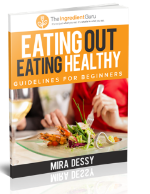Mira Dessy is the Ingredient Guru and a Houston area resident whose home was flooded in Hurricane Harvey. She is a practicing holistic nutritionist and meditation expert.
She’ll share both how she remediated her home and some of the emotional and physical health challenges she handled with nutrition, supplements and mindfulness.
We cover:
The DIY actions she is taking to restore her home
How a community can come together in a crisis
The symptoms she’s noticing right after the hurricane
The emotional toll of losing your possessions and your home
How even junky food, given with love, can be nourishing!
How to kick a sugar habit if you’ve relied on it through a disaster
The supplements Mira uses to stay healthy
How quick and simple meditations can help for sleep and stress
Resources
Download notes from this interview HERE.
Get Mira Dessy's free ebook: Eating Out Healthy
Moisture Meter - to make sure all surfaces are dry enough before beginning the rebuilding process.
To learn more about Mira Dessy, visit her website here and follow her on social media:
You can listen to this and all other episodes on the podcast or watch directly on our YouTube channel here.
Please enjoy these articles from our friends Trudy Scott from Every Woman Over 29 and Jodi Cohen of Vibrant Blue Oils:
Nutrition Solutions for Psychological Stress After a Natural Disaster
3 Steps to Combating Mold with Essential Oils
Essential Oils to Modulate the Toxic Effects of Mold
Tomorrow we’ll have our final day of Mold Week with Ryan James, teaching you how to get the most out of an insurance claim. Home remediation can be quite costly; let Ryan keep you from getting the short end of the stick from your insurance company.
Audio-Only Version
If you are on-the-go or have a poor internet connection, it will be more reliable to play the following audio-only version.
Free Guide: Healing from Toxic Mold
You want help for your mold symptoms ASAP! Cut to the chase with this straight-forward guide, outlining my favorite supplements for detoxing mold. As a person who has been healing from mold toxicity, I can personally say these supplements support my daily self-care effectively.
Let me help you start healing!
Bridgit Danner, LAc, FDNP
Founder of Hormone Detox Shop







